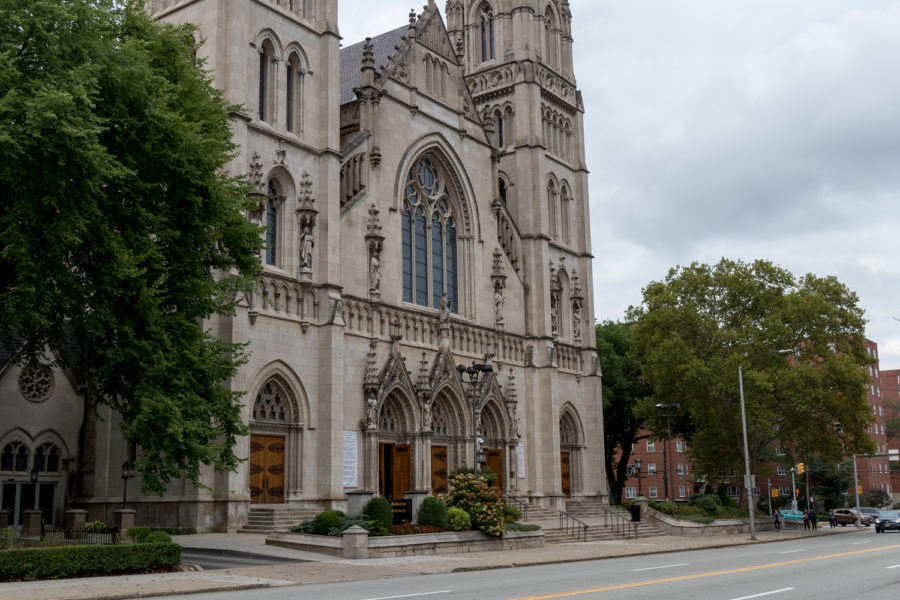Catholics respond to Pittsburgh diocese scandal
Saint Paul’s Cathedral on Fifth Avenue is a part of the Pittsburgh Diocese, which was implicated in the Pennsylvania Diocese Victims Report alongside five other Pennsylvania diocese. (Photo by Thomas Yang | Assistant Visual Editor)
September 12, 2018
As the church bells started ringing on a steady rainy Sunday, Jake Cherry, a sophomore biology major, climbed the stone steps of Saint Paul Cathedral, made the sign of the cross across his chest with fingers wet from holy water and took a seat in a pew — just as he has almost every Sunday since enrolling at Pitt.
Cherry’s faith in the Roman Catholic Church remains unshaken, he said, despite last month’s blistering grand jury report that painstakingly details how, for generations, hundreds of priests throughout Pennsylvania abused children — and how church leaders covered it all up.
“This is a terrible situation with so many troubling aspects, from the nature of allegations to the apparent manner in which the allegations were handled,” Cherry said.
Even so, Cherry said, the church can put this ugly chapter behind it. He wants to see action.
“[Leaders] must be thoughtful, decisive and quick to implement solutions,” Cherry said.
Pennsylvania Attorney General Josh Shapiro announced Aug. 14 the findings of a long-awaited grand jury report, which he described as “the most comprehensive report on child sexual abuse within the church ever produced in our country.”
At nearly 900 pages, the sweeping report identified some 300 priests who were accused of sexually abusing more than 1,000 children over the past seven decades. The alleged abuse occurred in six dioceses across the Commonwealth — Pittsburgh, Greensburg, Erie, Allentown, Harrisburg and Scranton.
Reactions to the grand jury’s findings among Catholics on Pitt’s campus were mixed.
“The most troubling aspect is how someone in a position of trust and power could so terribly hurt a vulnerable or trusting person,” Cherry said.
Connor Wrabel, a first-year, was even more pointed. Wrabel, the grandson of a church deacon, said he finds it difficult to trust the church in the wake of the allegations.
“The fact that allegations were ignored or brushed under the rug still shocks me,” Wrabel said. “[The church] betrayed our trust considering how long these allegations have stayed under wraps.”
In a prepared statement, leaders of Pitt’s Catholic Newman Club, which has around 300 student members, expressed sympathy for the victims of the reported incidents of abuse.
“We wish to express our sorrow for the victims and horror for the trauma they have experienced,” the statement said.
The statement went on to highlight the efforts the church is making to prevent similar incidents in the future.
“While the past is certainly bleak, it is important to recognize the positive changes that have been made to protect youth and to investigate any further allegations,” the statement continued. “By providing greater transparency as to how allegations will be handled and by cooperating fully with law enforcement, the church is committed to ensuring that an evil of this magnitude is never perpetrated again.”
Within the Diocese of Pittsburgh, the grand jury report accused 99 priests of sexually abusing minors. Shapiro specifically identified four priests who not only groomed but aggressively assaulted underage boys.
The grand jury also alleged that numerous church leaders across the state engaged in a sophisticated cover-up to protect the church, which allowed the so-called “predatory priests” to continue abusing children while escaping punishment.
For Catholic institutions, such as nearby Duquesne University, the scandal is devastating — but what impact, if any, the report will have on Duquesne and future enrollment remains unclear.
Paul-James Cukanna, Duquesne’s vice president for enrollment management, said he believes it is too early in the process of recruiting new students to speculate the impact this will have on future enrollments.
“The topic has not arisen in our prospective student discussions,” he said. “Our applicant counts, visits and prospective student interest in Duquesne are consistent with those of prior years.”
In a letter to the Duquesne University community in the wake of the grand jury report, University President Ken Gormley wrote that the allegations were “deeply disturbing.”
“The revelations within the report are heartbreaking, and as a community we feel great sorrow and anguish in reflecting upon the pain and suffering endured by those who were victims of abuse,” Gormley continued.
In the letter, Gormley said the university was aware of only one allegation in the report that relates to Duquesne. A priest who taught at Duquesne in the 1940s went on to serve the Diocese at Sacred Heart Church in Emsworth. It was there, in 1954, that allegations relating to actions at that parish surfaced against him two years before his death.
Like many others unwavering in their faith, Cherry said he believes the church will be able to come back from this.
“The church has faced questionable, if not misguided, leadership and troubling situations throughout the centuries,” Cherry said. “Each time, dedicated and honorable individuals have put the church back on track or reestablished confidence in the church. The foundation of the church is the belief system, which still exists.”



